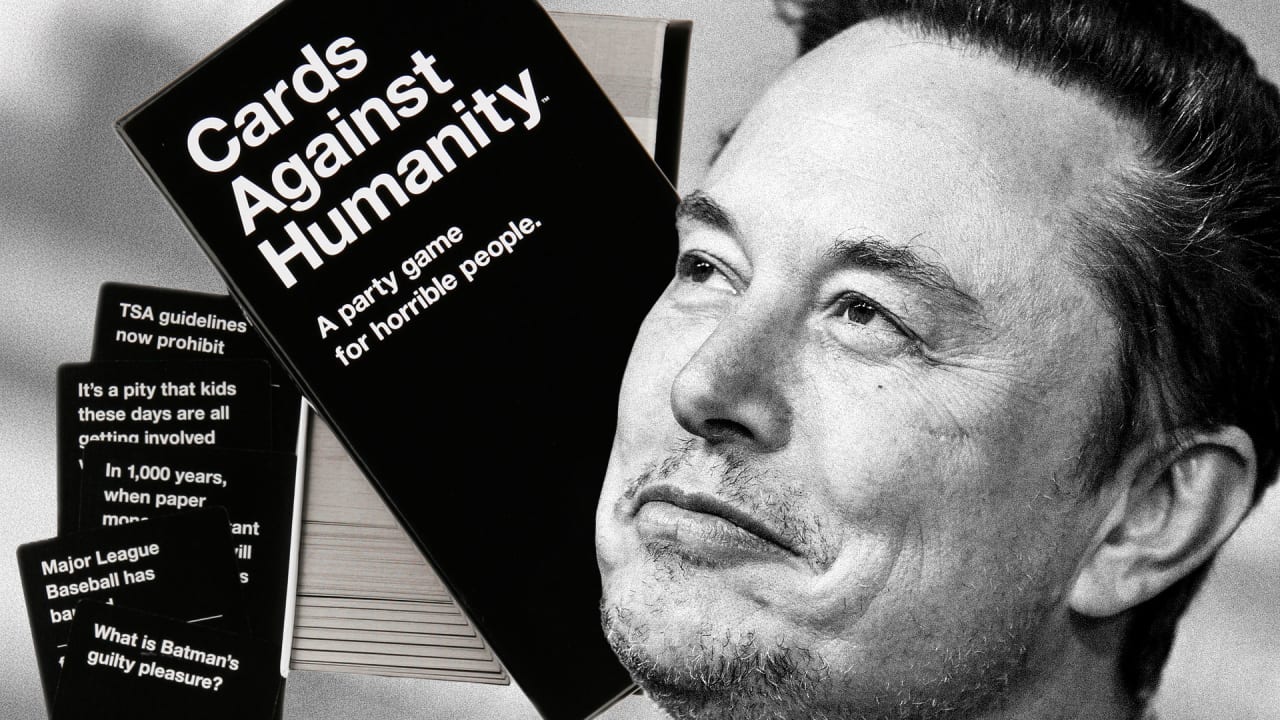Nobody does publicity stunts quite like Cards Against Humanity. The organization, whose namesake card game plays like competitive Mad Libs for Rick and Morty fans, has previously sent customers boxes of actual feces and dug an enormous hole in the ground—in both cases, as satirical commentary about Black Friday.
The party game company clearly pride itself on generating headlines that deftly reflect the game’s excremental humor. Its latest publicity stunt, however—a lawsuit against Elon Musk’s SpaceX, accompanied by a typically naughty word-filled website—is about more than just trolling a controversial public figure or garnering attention through any means necessary. Beneath its goofily rebellious posturing, the game-maker company’s lawsuit is about taking a stand against the aggressive intimidation tactics of powerfully wealthy tech oligarchs.
It all started in 2017, with yet another Cards Against Humanity stunt. In the early days of the Trump administration, the makers launched the clunkily titled Cards Against Humanity Saves America initiative, asking fans to commit $15 each toward the company purchasing a plot of land on the U.S./Mexico border, slightly stifling the then-president’s efforts to create a border wall. (“It’s 2017, and the government is being run by a toilet,” reads the campaign copy before delving into the details.) Ultimately, 150,000 fans kicked in for the effort, helping to secure some obstructing land in Cameron County, Texas.
Although the parcel of land had reportedly been maintained in its natural state ever since, SpaceX allegedly began trespassing on it earlier in the year and leaving debris around it. According to the lawsuit, SpaceX had previously acquired more land nearby and began using the Cameron County property as a dumping ground for construction materials, without asking permission. The company is now suing Musk for $15 million, the proceeds of which it promises to give away to the 150,000 fans who helped fund the purchase seven years ago, a hundred bucks each. (That amount is referenced in the dedicated website’s cheeky url: ElonOwesYou100Dollars.com, which contains photos of how SpaceX “completely fucked that land with gravel, tractors, and space garbage.”)
Some of this, of course, seems deeply unserious—like the part where CAH offers to accept “Twitter.com” as compensation, rather than $15 million, a dig at the platform’s declining value. (Representatives for Cards Against Humanity did not respond to a request for comment.) On its website, the company claims as impetus for the lawsuit that, by ruining the pristine nature of the land, Musk is damaging Cards Against Humanity’s reputation for making outrageous promises and actually keeping them. (“If we don’t take action now,” the site reads, “why would anyone ever trust us again?”) The idea that anything short of waging an expensive, protracted court battle would strike the game company’s fans as dereliction of duty is pure farce. The company’s reputation for going all the way with its ridiculous promotions seems secure for now, no matter what happens in this legal land skirmish.
The real reason for the lawsuit, though, beyond publicity and perhaps some legitimate animosity toward Musk, is not just because SpaceX refused to comply. Rather, it seems to stem from the way SpaceX refused to comply.
As CAH describes it on its new site: “After we caught [Musk leaving material on the property], SpaceX gave us a 12-hour ultimatum to accept a lowball offer for less than half our land’s value.” (Fast Company has reached out to SpaceX for comment and will update if it respond.) This description matches the way homeowners in the area describe SpaceX’s efforts to buy them out, as recently reported by Reuters, which also touches on the game makers’ lawsuit. One retiree in the piece recalls getting a “take-it-or-leave-it” offer of $340k for her two houses, with SpaceX refusing to buy just one. (As of this past June, SpaceX was valued at $210 billion.)
Regardless of how much Cards Against Humanity’s campaign is designed to create publicity, it’s also bringing attention to the tech billionaire’s reputation for forcing others’ hands.
For instance, when Musk wanted Tesla workers to make a post-quarantine return to the office in 2022, he didn’t attempt to persuade those workers around the wisdom of his decision. He didn’t make the push gradual either, by, say, mandating two days a week at first and bumping it up over time. Instead, he reportedly gave Tesla’s workers an ultimatum—come back to the office or find a new job—a move that CNBC reported led to several problems, including a pronounced decline in company morale.
Later that same year, when Musk took over Twitter, he presented employees at that company—the ones he hadn’t already simply let go—with another ultimatum: commit to “extremely hardcore” work (vaguely defined by an exhausting-sounding workload and mindset), or quit. The employees had until 5 p.m. the following day, 24 hours total, to decide.
Both ultimatums amount to a gaudy show of power that leaves no room for maneuvering. This appears to be a regular facet of Musk’s M. O.
Sometimes, however, his aggressive tactics work against him. Musk used them in a hostile takeover bid for Twitter in 2022, for reasons that remain unclear, and when the company accepted his offer 11 days later, Musk was forced to go through with the purchase, despite his efforts to wriggle out of the deal. Perhaps SpaceX’s pugnacious approach to the land deal with the game makers will similarly backfire.
Some of the pressure campaign against SpaceX is currently happening on X/Twitter. Cards Against Humanity created templates for tweeting at Musk directly about the land deal, whether you’re one of the people who helped purchase it or just a concerned observer. Droves of X users appear to be tweeting out both templates.
It’s the kind of campaign that could potentially inspire the deeply litigious Musk to sue over, perhaps claiming targeted harassment. But a countersuit would likely only bring further attention to Cards Against Humanity. And that seems to be at least partly the point.













